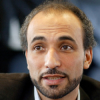Tariq Ramadan

Tariq Ramadan
Tariq Ramadanis a Swiss academic, philosopher and writer. He is the professor of Contemporary Islamic Studies in the Faculty of Oriental Studies at St Antony's College, Oxford and also teaches at the Oxford Faculty of Theology. He is a visiting professor at the Faculty of Islamic Studies, the Université Mundiapolisand several other universities around world. He is also a senior research fellow at Doshisha University. He is the director of the Research Centre of Islamic Legislation and Ethics, based in...
NationalitySwiss
ProfessionWriter
Date of Birth26 August 1962
CountrySwitzerland
In my book, the Arab Awakening, I talk about the fact that we have to move from this. All the contemporary ideologies of political Islam have been based on the nation state. The nation state is very problematic but I'm not sure if we have an alternative political model.
Pushing the limits, to be thought provoking, pushing people to think and question the limits, it's not always bad for the rules if you're confident because it can even strengthen your understanding of religion in the process.
If you know how to live, even death is good news
Don’t nurture a sense of guilt; rather, nurture a sense of responsibility married with a sense of humility.
Times have changed; so must the lenses through which we see the political future.
The problem, once again, as in all sciences is the attitude of the mind that is dealing with whatever field. The problem is not philosophy but the lack of intellectual humility. It is when reason becomes arrogant that we lose track. But intellectual humility with science: this is spirituality - this is the way we are with God. So we should not be scared and we must reconcile ourselves.
Teach the heart not to give way to proud emotions and arrogant thinking; bring the mind to heart-soothing solutions that make it possible to control oneself gently and wisely.
I think that political parties are fuelling this fear in order to create divisions. The more we bring up fear, the more we neglect real political issues. Political debate in France is crumbling since every single issue is brought to Islam now.
What we also need to have a discussion on the philosophy of art: so we must ask what is it that we want in the first place? Is it just about saying and doing whatever you want, or is it about something more? We should let the artist be free, but we must also question how exactly he deals with freedom. Is it arts for elevation or arts for destruction? Is there dignity in the process?
If you look at how we are destroying and disrespecting Creation it is obvious that is something is not clear in our understanding. We overemphasize rules but we don't understand the objective.
Our democratic societies are in danger. In allowing ourselves to be infiltrated by fear, to be blinded by the passion of identity, we are entertaining the most serious illusions about our freedom.
History is replete with ideologies of freedom, justice, liberation of the downtrodden and the exploited, that have been turned against the very people they had mobilised, or that have reproduced the same logic of exclusion and terror toward those whom they claimed to set free.
We must delve deep into history the better to engage a true dialogue of civilisations. Fear of the present can impose upon the past its own biased vision.
Nature is telling us that if you don't respect the environment then you are living with artificial needs and a consumerism that is destroying the very conditions we need to survive.